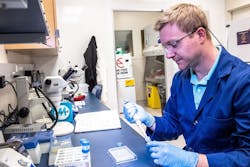Army joins with other military researchers to develop sensors to help prevent spread of COVID-19 virus
ABERDEEN PROVING GROUND, Md. – U.S. Army scientists have teamed with the Defense Advanced Research Projects Agency (DARPA) and others to build sensors that would detect COVID-19 proteins in the air. Army Times reports. Continue reading original article
The Military & Aerospace Electronics take:
19 March 2021 -- The team of researchers includes Army scientists with the U.S. Army Combat Capabilities Development Command at Aberdeen Proving Ground, Md., Georgia Tech Research Institute in Atlanta, Cardea Bio Inc. in San Diego, and the University of Georgia in Athens, Ga.
The prototype sensor the group is developing would help detect the COVID-19 virus with enough speed and accuracy that users could prevent infection from spreading.
The team is taking the receptors produced during the past year of COVID response work. If successful the sensor could allow for a new way to monitor public health beyond the U.S. Department of Defense, such as monitoring for COVID-19 at work sites, travel points, and schools.
John Keller, chief editor
Military & Aerospace Electronics
